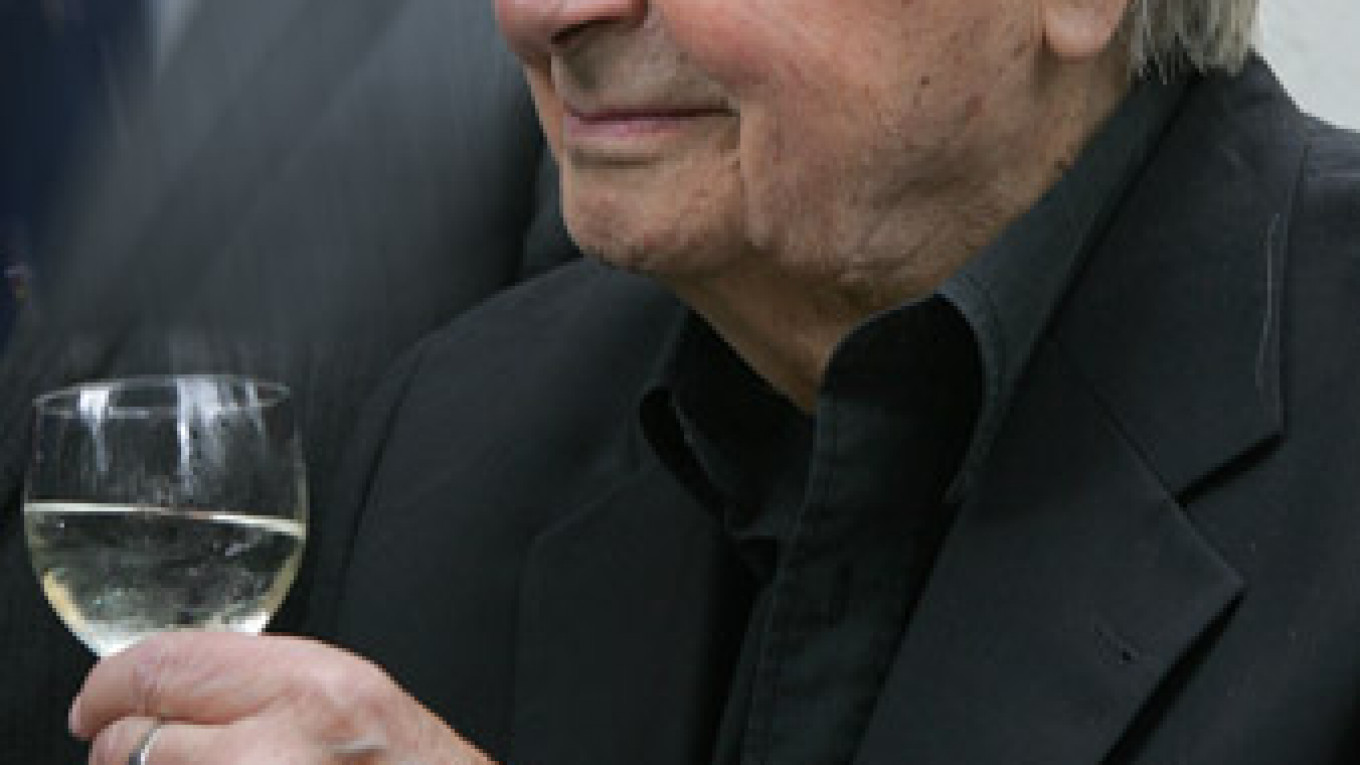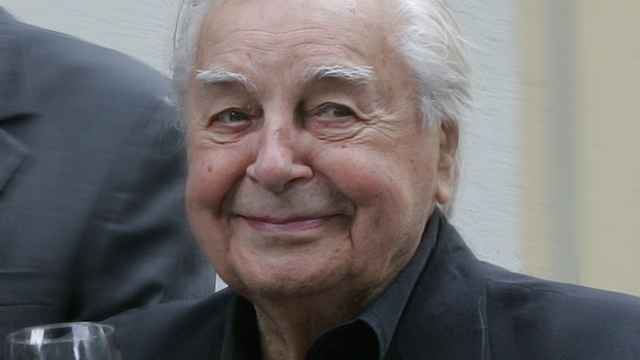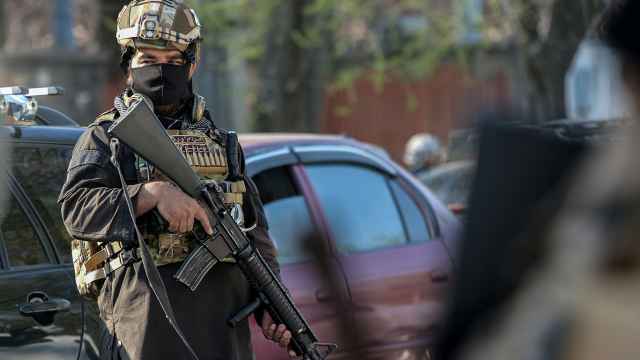Yury Lyubimov, who died late Sunday morning at the age of 97, was a man of and for his times.
There is something uncanny about the way his life played out in time. The algorithms aren't perfect, but something in them suggests a higher plan.
Lyubimov was born a week before the 1917 Revolution. He died on Oct. 5, three years short of age 100, five days after his 97th birthday.
He was recognized as a talented actor in his early years, but only began taking steps toward greatness when, at the ripe age of 46, in 1964 (note the neat turnaround of the '4' and the '6'), he took over as artistic director of a moribund theater called the Theater of Comedy and Drama on Taganka Square and reinvented it as the Taganka Theater.
In 2011, 47 years later, the director, now routinely referred to as a legend, was compelled to abandon the famous playhouse he founded following a series of bitter conflicts with actors.
Lyubimov's death comes just three months after the Taganka completed a year-long celebration of the theater's 50th anniversary.
But, intriguing as they are, those are just numbers. And Lyubimov was all flesh and blood. He was funny. He was acerbic. He was smart. He could be extraordinarily gentle. He could be vindictive and imperious.
He was forever loyal to the actor he loved more than any other — the legendary Vladimir Vysotsky, who died in 1980, thus plunging the Taganka into its first serious crisis.
There would be many more crises.
Lyubimov was stripped of his citizenship and exiled in 1984 by the Soviet government when he refused to return to Moscow from London where he had mounted a production of "Crime and Punishment."
Famously, one Soviet official reportedly said Lyubimov had "committed his crime" and now it was time to come home "for his punishment." He did return to Moscow, triumphantly, in 1989, but within two years was embroiled in a bitter civil war that caused half his troupe to secede and found a new venue called the Commonwealth of Taganka Actors, taking with them half of the Taganka's real estate.
The scandal ending Lyubimov's affiliation with the Taganka in 2011 arose when actors complained they were not paid properly during a tour to the Czech Republic. Mutual incriminations were bandied about in the tabloids for weeks before Lyubimov, figuratively, stormed out and slammed the door behind him.
In his career Lyubimov staged 66 productions at the Taganka, adding three more in Moscow at other venues. He staged 48 works abroad, occasionally repeating his biggest Moscow successes on European stages, but more often staging operas at the world's top opera houses, including La Scala in Milan and the Grand Opera in Paris.
His last project in Moscow was to write the libretto and conceive the production of Vladimir Martynov's "The School of Wives" at the Novaya Opera. It premiered in May this year. Lyubimov planned to stage the work, but backed out for health reasons.
Following Lyubimov's hospitalization at Botkinskaya Hospital on Oct. 2, news agencies reported that he had suffered heart failure. Georgy Golukhov, head of Moscow's Health Department, told Interfax on Sunday that that wasn't true. "His condition was determined by his age. After all, the director was 97 and in his long life he had suffered many illnesses, the consequences of which made themselves known today," Golukhov said.
Two hands won't count Lyubimov's Taganka productions that changed Russian theater history. An abbreviated list surely begins with the first, Bertolt Brecht's "The Good Person of Szechuan" (1964) and might continue with John Reed's "Ten Days That Shook the World" (1965), "Listen!" (1967) after the poetry of Vladimir Mayakovsky, Shakespeare's "Hamlet" (1971), Mikhail Bulgakov's "The Master and Margarita" (1976), Fyodor Dostoevsky's "Crime and Punishment" (1979), Yury Trifonov's "The House on the Embankment" (1980), and Alexander Pushkin's "Boris Godunov" (1982, revived in 1988).
The Taganka came into being in the mid-1960s, in the dying moments of Khrushchev's Thaw, just as what is now occasionally called the era of stagnation began.
Lyubimov, through his actors and productions, spoke truths that spellbound audiences could not hear publicly anywhere but in a theater. Deeply influenced by German writer and director Bertolt Brecht, who combined high theatricality with radical politics in his work, Lyubimov transformed the Taganka into what many called the "conscience of the Soviet Union."
American playwright Arthur Miller once said the Taganka "renewed his faith" in theater.
Taganka actors often stepped to the edge of the stage, looked spectators in the eyes, and pronounced their lines in a personal, though declarative way.
Such an acting device gave otherwise innocuous phrases the power of sedition. It also broke down the so-called "fourth wall" that traditionally separates what transpires on stage with what is experienced among spectators. Thus audiences at the Taganka were encouraged to become accomplices in the sometimes risky business of Lyubimov's shows.
Ever true to Brecht, Lyubimov also aimed to entertain. His use of music and physical activity on stage always gave his work a light, amusing quality that offset well the darker political undertones.
A couple of Lyubimov's productions, "Alive" in 1968 and "Vladimir Vysotsky" in 1981, were banned by censors who felt he had gone too far. Several of his shows were subjected to serious criticism before they opened, but were not banned outright.
The topic of Lyubimov's relationship with the authorities is a complex one that has yet to be fully investigated.
Like many important artists, including composer Dmitry Shostakovich, Lyubimov served as an actor in the NKVD Song and Dance Ensemble, whose purpose was to raise the morale of the troops during World War II. The NKVD was the precursor to the KGB and today's FSB. There he made friends who would prove to be of use in later years when conflicts arose.
Lyubimov had a personal relationship with Yury Andropov, the head of the KGB from 1967 until 1982, when he became the general secretary of the Communist Party.
In another of those seemingly curious combinations of dates, Andropov died in February 1984 and Lyubimov was exiled in March 1984. But it is hard to imagine that was a coincidence.
While often railing against government leaders throughout his life, Lyubimov always appreciated their support when it came.
In an interview with Interfax published on his 97th birthday, Lyubimov proudly noted that Russian President Vladimir Putin was one of the hundreds of luminaries and celebrities who affixed their signatures to the famous graffiti-lined wall of Lyubimov's office at the Taganka. A congratulatory birthday note from Putin was still the top post on Lyubimov's personal website hours after his death on Sunday.
By Sunday afternoon, the push and pull of history and historians had already begun.
Alla Demidova, the Taganka's top actress in the 1960s and 1970s, wrote of Lyubimov changing Russian theater history in a short blog for the Ekho Moskvy website.
Pavel Rudnev, writing on the website of Teatral magazine, declared that "Lyubimov was not just a director, he was an organizer of the theatrical space. The Taganka sent out a multitude of branches in various directions. Lyubimov was a 'hot house' for theatrical experimentation."
"Lyubimov is a man whom people will remember for a very long time," Mark Zakharov, the longtime artistic director of the Lenkom Theater, told RIA Novosti. "His contribution to our Russian culture is multifarious. He was like fireworks for so many years."
Public memorial services will be held Tuesday and Wednesday morning at the Vakhtangov Theater on Arbat, where Lyubimov staged his first production in 1959, Alexander Galich's "Does a Man Need Much," and his last dramatic production, Dostoevsky's "The Devils," in 2012.
Contact the author at artsreporter@imedia.ru
A Message from The Moscow Times:
Dear readers,
We are facing unprecedented challenges. Russia's Prosecutor General's Office has designated The Moscow Times as an "undesirable" organization, criminalizing our work and putting our staff at risk of prosecution. This follows our earlier unjust labeling as a "foreign agent."
These actions are direct attempts to silence independent journalism in Russia. The authorities claim our work "discredits the decisions of the Russian leadership." We see things differently: we strive to provide accurate, unbiased reporting on Russia.
We, the journalists of The Moscow Times, refuse to be silenced. But to continue our work, we need your help.
Your support, no matter how small, makes a world of difference. If you can, please support us monthly starting from just $2. It's quick to set up, and every contribution makes a significant impact.
By supporting The Moscow Times, you're defending open, independent journalism in the face of repression. Thank you for standing with us.
Remind me later.







